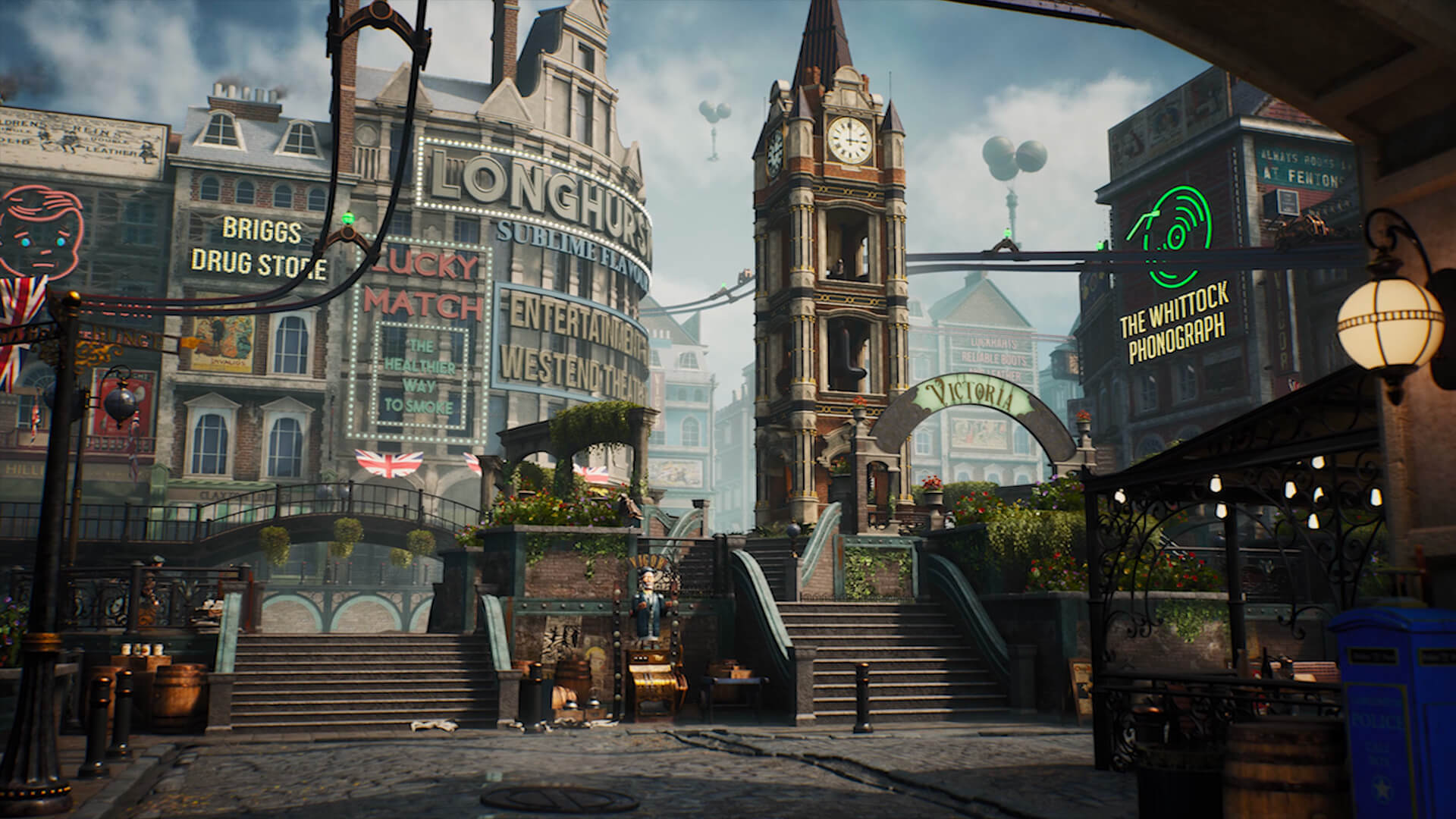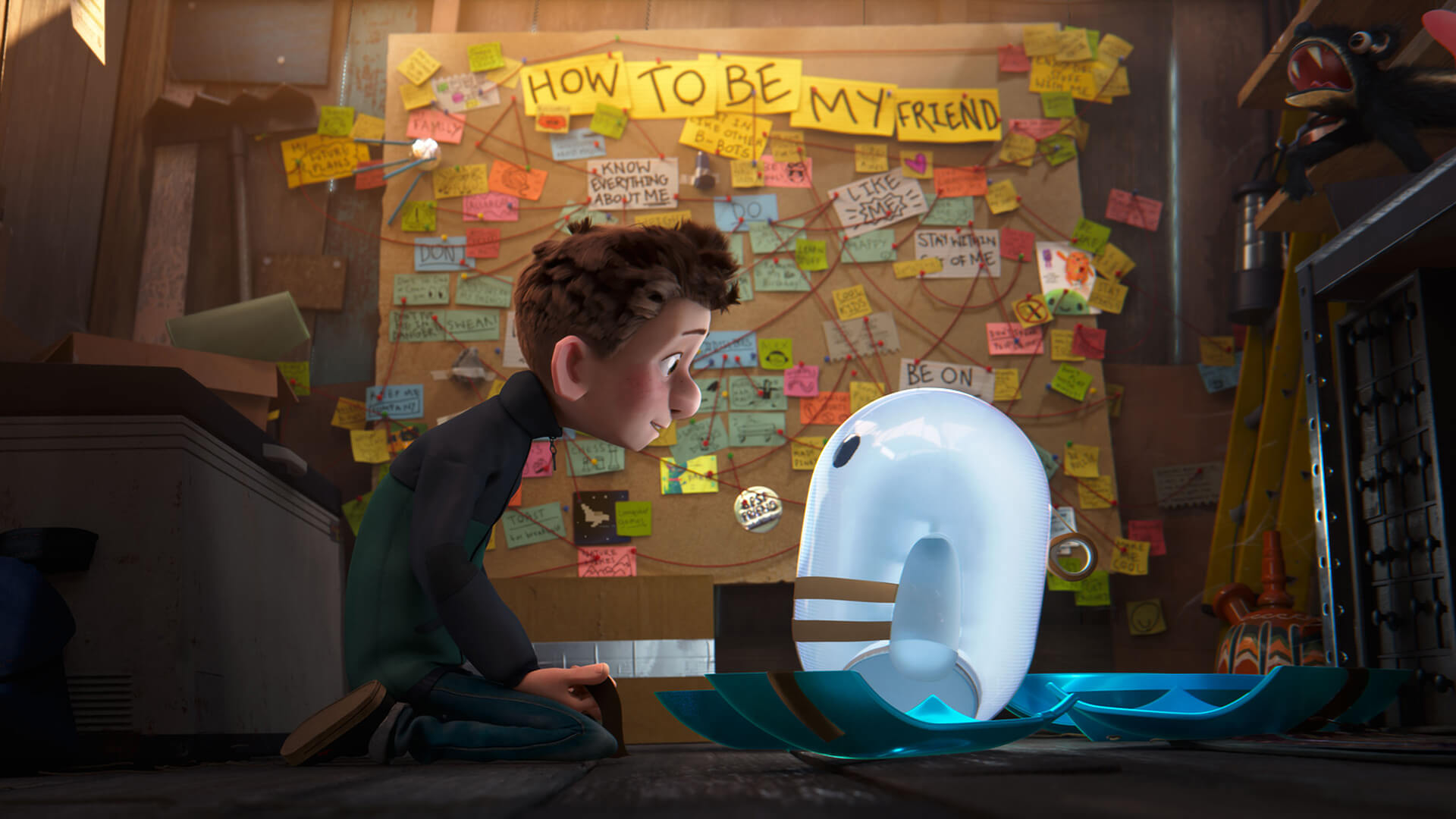MA Concept Art and Experience Design
MA Concept Art and Experience Design
Course Details
Location
Start date
15th September 2025
23rd February 2026
Duration
1 year
Contact time
2.5 days per week
Entry requirements
An undergraduate honours degree in a related subject or equivalent industry experience, plus a portfolio of creative work.
Fees
London campus (UK students): £12,450
London campus (international students): £19,995
Live online: £12,450
Degree awarded by
Scholarships and discounts
To be eligible for scholarships and discounts, apply by:
- 23rd June (September 2025 intake)
- 1st December (February 2026 intake)
Atomhawk joins Escape Studios to bring students a brand-new, industry-focused Concept Course. Professionally tailored modules and firsthand Atomhawk insights to prepare the next generation of UK gamedevs. Make the unbelievable, believable.
Course overview
This masters degree encapsulates the many roles that a Concept Artist / Designer can do in the entertainment industries. We focus on digital design for industries, such as games, animation and film, as well as real thematic environments in the areas of experiential design for branded events, theme parks, interiors and museums using a combination of 2D and 3D approaches.
As well as games and film design, you’ll learn design methodologies and artistic practice from the fields of industrial design, concept art for characters, props and environment design as well as experiential design for thematic real-world scenarios used in events, branded entertainment, theme parks, museums, installations, set design, VR visualisation and VAD (Virtual Art Department).
You'll develop your design skills and build upon core fundamentals of traditional and digital drawing, digital painting, design and digital art practice, allowing for pathways that utilise industry standard approaches. You'll elevate your designs, develop new approaches in 2D and 3D, empowering them to create concept art for their portfolios and projects. For the 2D Artist this course provides the platform to learn how to augment their existing workflows with new technologies in real-time engines and 3D visualisation.
This masters degree covers the fundamentals of drawing, design and 3D modelling as part of the concept art and design pipeline. Individual course modules include: Environment Design, Character and Costume and Thematic Entertainment Design, with a further two modules for students to pursue their own desired industry specialisms, supported by industry briefs and mentoring.
Upon graduating from Concept Art and Experience Design will have the training to develop a sustainable and exciting career in both 2D and 3D visualisation and able to use the latest tools and design methodologies in a range of exciting and developing sectors.
Why choose this course
- Designed with industry - this course has been created with Atomhawk, three global, award-winning studios who provide creative support across the full game development pipeline through art, design and technical excellence.
- Get to grips with the software used in industry, including Adobe Photoshop, Blender, Photoshop and Unreal Engine.
- Work on industry-standard briefs and experience real-life scenarios, just like in a professional studio
- Receive feedback from industry professionals - an opportunity to level-up your work and build connections, ready to embark on your creative career.
- Recognised degree - graduate with a postgraduate MA qualification awarded by Coventry University which will boost your employability around the world.
- Aftercare package - we'll help you polish your portfolio and find the right job, with access to our studios and showreel clinics for 12 months.
)
)
)
Meet our industry-experienced tutors
Our tutors have industry experience and are experts in their fields, including certified trainers for Unreal Engine, Autodesk and Houdini. They've worked at studios such as Walt Disney, EA and Framestore, on credits including Doctor Strange, Kingsman and Bond: Spectre.
Course modules
Module 1 - Concept Art Foundations
7 weeks (30 credits)
Foundations in 2D drawing approaches and Design.
- Digital drawing style and approaches
- Perspective and technical drawing
- 2D technical workshops
- Tonal approaches
- Digital Painting
- Colour Theory
- Art history 1
- 3D modelling for Digital Paintovers
- Introduction to (Blender)
- Technical workshops
- Lighting and rendering for illustration
- Art history 2
Project - Environmental Design for a game
Module 2 - Character and Costume Design
7 weeks (30 credits)
Digital Drawing, Painting and Design of Characters.
- Digital drawing style and approaches
- 2D technical workshops
- 3D technical workshops
- Character and Costume design history 1
Project - Character and Costume design for an established IP.
Module 3 - Thematic Environment Design
7 weeks - (30 credits)
Digital Drawing, Painting and 3D Design for Themed Environments.
- Digital drawing style and approaches
- 2D technical workshops
- 3D technical workshops
- Architectural history 1
Project - Design and concept a themed environment
Module 4 - Industry specialism
10 weeks (30 credits)
Student led specialism research project with a negotiated brief.
Project- Tutor mentored, Individual negotiated project brief.
Module 5 - Final Project
16 weeks (60 credits)
Students work individually or in small groups to create design for industry mentored project brief.
Project- Industry mentored, Individual negotiated project brief.
For more details about modules, see the programme and module specifications.
More information
Entry requirements
Minimum requirements
An undergraduate honours degree in a related subject or equivalent industry experience, plus a portfolio of creative work.
If you're not sure about your qualifications, get in touch.
International students
We welcome applications from qualified candidates all over the world.
Postgraduate applicants will need a good undergraduate degree in a relevant subject (or significant professional experience) and a postgraduate portfolio.
Head to our international hub for more information. For any questions, reach out to our Admissions Team: admissions@escapestudios.ac.uk
English language requirements
All our courses are taught in English. If your first language is not English, you may need to complete an English language test, such as a Pearson English language test (PTE Academic) or International English Language Testing System (IELTS) test, to demonstrate you have the language skills needed to complete your degree.
| Qualification | Score required |
|---|---|
| IELTS for UKVI (Academic) | 6.0 IELTS (with a minimum of 6.0 in Reading and Writing and 5.5 in Speaking and Listening) |
| PTE Academic UKVI | 62 including 60 in each subtest |
International students will be required to hold a Secure English Language Test (SELT) at B2 in order to be able to apply for a visa to study at Escape Studios on a student visa. Visit the government website for guidance
You may be exempt from proving your English level if you are from an English-speaking country listed as recognised for visa purposes or have a degree level qualification obtained in one of these countries. The latest list is available on the UK Government website.
For students who have a SELT at B2 but who do not meet our requirements, we can also consider alternative qualifications. Please contact admissions@escapestudios.ac.uk for more information.
If you’d like to discuss your circumstances before applying, contact us at admissions@escapestudios.ac.uk or +44 (0) 20 4570 5091.
Online study requirements
We can provide remote access to our workstations during teaching time. Due to availability restrictions, we highly advise you to have your own set up at home to study in your own time.
More things you’ll need:
- A strong internet connection
- Cloud storage or external hard drive to back up your work, 1TB+ recommended
- A three-button mouse or graphics tablet. Please note, the Wacom Intuos Pro range of tablets have the best support for our remote desktop software and provide the best experience.
- A computer microphone (and optionally a webcam)
- Note-taking materials.
If you have any questions about learning online or if you need help with what to buy, get in touch at hello@escapestudios.ac.uk.
How to apply
To apply, complete an online application form. Our Admissions Team will get in touch to take you through the next steps.
To apply for one of our postgraduate masters programmes, you can complete an online application form, found on the relevant course page on our website. If your application is accepted, we'll ask you to submit a creative portfolio of work. Check out our creative portfolio guide for guidance on what we expect to see.
There isn't a formal application deadline for most of our postgraduate courses, but you may need to apply by a certain date to be eligible for our postgraduate scholarships or discounts.
If we make you an offer for a place on one of our programmes, you will need to agree to our terms and conditions for your place on the course to be secured.
Fees and funding
Fees
London campus:
- UK students: £12,450
- International students: £19,995
Live online: £12,450
Our postgraduate fees are payable within the first 18 weeks of the course, with a deposit to be paid one month before the start of the course. Please note, we review our fees every year.
Funding for UK students
For UK students living in England, you have the option to apply for a Government Masters Loan and borrow up to £12,471 in 2024/25, to help fund your course.
To be eligible for funding from Student Finance England, you must be studying on an eligible course at a provider registered with the Office for Students (OfS). Escape Studios is registered with the Office for Students and our masters programmes are eligible for funding.
Visit www.officeforstudents.org.uk for more information.
Payment plans
We offer payment plan options for all courses. Following an initial deposit at registration stage, your chosen payment plan will break down your remaining fees into up to three instalments.
Contact our Admissions Team on admissions@escapestudios.ac.uk or +44 (0)204 570 5091 or visit our admissions page for any questions about fees, funding and payment plans.
Assessment
The assessment methods employed in this programme have been developed to mirror industry practice as far as possible. We balance feedback from tutors and industry experts. It is crucial that, as a student, you learn how to accept and work with feedback from your superiors and peers, as this will be the norm when you work in industry. You also need to develop a keen self-critical eye, to be able to step back from your work and see what you could improve, and to have the ability to look at yourself and your working practices and make changes where necessary.
Formative assessment
This is one of the most important aspects of your work. You will receive regular feedback from your tutor, studio assistants and peers during your modules. This will often be oral feedback on your work, sometimes on a one-to-one basis, sometimes in a group feedback session or daily. All of this should help you build on your strengths and develop your skills as you progress through the course.
Summative assessment
This will be specifically designed to measure how well you meet the learning outcomes of the module. They will usually involve a task to meet a brief set by your tutor and will allow you to demonstrate the knowledge and skills that you have learned during the module. You’ll need to decide exactly how to complete the task, choosing particular techniques and approaches, and making decisions on the aesthetics and style to meet the given requirements.
Each module will have a practical element (usually a practical project, where you make something) and a written element (usually a journal or blog, where you reflect on what you’ve made). Sometimes you will also have to give a presentation to demonstrate your work. All these elements are essential to your development, by showing that you can deliver to a required level and that you understand why you can and how you could improve.
Summative assessment breakdown
Craft module:
- Individual project - 75%
- Presentation - 25%
Specialism project module:
- Specialism project - 75%
- Specialism presentation - 25%
Production module
- Production project - 60%
- Production logbook - 40%
Teaching and learning
Your overall workload will be divided between teaching sessions (2.5 days per week) and independent learning.
During your course, you’ll be able to develop your knowledge and skills in a number of ways. Some learning time will be closely directed and supervised by your tutors, at other times you’ll be free to organise your own study with guidance. All your scheduled studio time, except for some information sessions and presentations, will be in smaller groups based on specialism.
For your team project, you’ll be working with a smaller team, collaborating to meet a shared brief. This will give you ample opportunity to get the support and assistance that you need.
The first three modules have a high contact time (180 hours for each module), as this is where you will learn the knowledge and skills associated with your chosen subject, directed and informed by your tutors’ expertise and experience. These will normally involve a large part of each day with your tutor and studio assistant, following demonstrations and working on set exercises to help you develop your craft.
The Studio Project and Production Project modules will have a lower contact time (15 hours and 30 hours respectively), with your tutors taking on the roles of supervisors or studio leads. You’ll meet with them regularly to get feedback and help you stay on the right path, but these modules are much more about you managing the learning experience to meet your objectives. You’ll be free to organise your work either as a team or an individual to best suit your project requirements.
Each module has its own area on our Online Learning Environment (OLE) where you will find information about the module and the resources that are provided to support your learning. Some of this information will be dedicated to the module, other elements may be shared across different modules and some may be external assets that can help with your further study. There may be links to videos, online journals and e-books, and you should take advantage of these to enhance your development and take it beyond the studio experience. Tutors may highlight some of these during their sessions.
Students with additional needs or disabilities are supported by our Student Services team.
Overall workload
This programme has two entry points each year. It is divided into two stages. Stage 1 comprises modules to a total of 120 credits and stage 2 comprises a 60-credit Production Project module. You must successfully complete each module in order to be awarded the specified number of credits for that module. One credit corresponds to approximately ten hours of 'learning time' (including all classes and all private study and research). Obtaining 180 credits in an academic year requires 1,800 hours of overall learning time.
The first three modules are taught in intensive blocks of eight weeks each, giving a total of 24 weeks. During each of these modules, you will spend around 30 hours per week studying in tutor-led sessions or practice supported by studio assistants. The final two modules are more self-directed. The Studio Project will take around 8 weeks, during which you will have around 15 hours of feedback sessions with your tutor. Finally, you will spend around 16 weeks on the Production Project, including around 30 hours of feedback sessions with your tutor.
Each 30-credit module on the course requires you to commit 300 hours of study, with one 60-credit module which requires 600 hours of study. Some of these hours will be formally supervised in the learning environment and others will involve private study.
For more details about modules, credits and workload, see full programme specifications.
Software
- Photoshop
- Blender
- Unreal Engine



